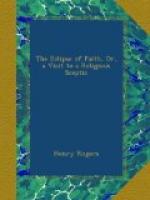The Prospective Review for August, in an article on the work, for the most part commendatory, though certainly without any warmth of praise, makes the prominent stricture upon it to be, a charge against the author of having evaded “the gravest, and in one sense the only serious difficulty, with which the evidences he supports have to contend.” This difficulty is defined to be in the question as to whether our four Gospels are essentially and substantially documents from the pens of Matthew, Mark, Luke, and John, actual companions and contemporaries of Him whose life and lessons are therein recorded. The Reviewer professes to have satisfied his own mind by an affirmative conclusion on this point. But regarding the question as the very turning-point, the paramount and vital element of the existing issue between faith and unbelief, and not finding it to be dealt with in this volume, the Reviewer considers that it is evaded. It might be urged in reply, that this question is not to other minds of such paramount importance, and that its affirmative answer would not be conclusive, as it would still leave open other questions; such, for instance, as those which enter into the theories of Paulus and other Rationalists, and such as are not even excluded from the incidental adjuncts of Strauss’s mythical theory. It might also be urged, that, allowing the question to be paramount in its relation to the whole issue, it is one which is not so judiciously dealt with in the discursiveness of dialogues after dinner, as in the solitary study, with piles of huge tomes, lexicons, and manuscripts that require a most deliberate examination. But to leave the merits and the relative importance of this question undebated, it might have been more generous in the Reviewer to have confined his criticisms to a decision upon what the author has endeavored to accomplish, instead of impugning his judgment in the selection of the points on which to employ his pen. How ever desirable it may be that we should have in another form what Mr. Norton has presented so thoroughly in his work on the Genuineness of the Gospels, it is enough to answer to the Reviewer in the Prospective, that the writer of this volume addressed himself to a different course of argument, starting from other divergences of opinion, philosophical rather than critical in their relations. He certainly was free to select the method and the direction of his argument, if he candidly represented the answering point of view of those to whom he opposed himself.
Amid many episodes and interludes of fancy and narrative, it will be found that the volume arrays its force of argument against two of the assumptions alike of modern and of ancient scepticism; namely, that a revelation from God to men through the agency of a book is an unreasonable tenet of belief; and that it is impossible that a miracle should occur, and impossible that its occurrence should be authenticated. There is a vigorous and logical power displayed in the discussion of these two points. The discomfiture of those who urge these assumptions does not of course convince all scepticism, or substitute faith for it, but it is something to discomfit such pleas, and to expose the fallacies which confuse the minds of their advocates. The matters of debate are lofty, and there is no levity in their treatment.




